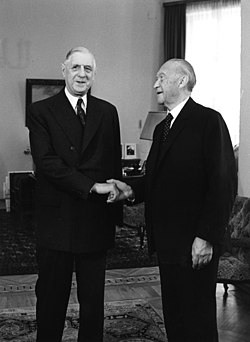Hegemonic stability theory (HST) is a theory of international relations, rooted in research from the fields of political science, economics, and history...
65 KB (8,635 words) - 12:53, 30 June 2025
Hegemonic Stability Theory." International Organization 39 (4): pp. 580–614. Grunberg, Isabelle (1990). "Exploring the ‘Myth' of Hegemonic Stability."...
59 KB (7,107 words) - 13:39, 29 June 2025
macroeconomy Hegemonic stability theory, a theory of international relations Mertens-stable equilibrium, called "stability" in game theory Political stability The...
4 KB (507 words) - 12:16, 23 March 2025
is not possible, as well as hegemonic stability theory claims that international cooperation is only possible under hegemony. The book applies insights...
4 KB (463 words) - 03:02, 13 February 2025
known for his role in developing what would become hegemonic stability theory, arguing that a hegemonic power was needed to maintain a stable international...
18 KB (1,869 words) - 15:36, 29 June 2025
Liberal institutionalism (category International relations theory)
could remain stable in the absence of a hegemon, thus rebutting hegemonic stability theory. Keohane showed that international cooperation could be sustained...
24 KB (2,566 words) - 19:34, 23 June 2025
University of Washington Press, 1987, 102 Mark Rupert. "Hegemonic Stability Theory. "Hegemonic Stability Theory". Archived from the original on 2002-12-14. Retrieved...
41 KB (4,930 words) - 02:01, 28 May 2025
propose power-based theories of regimes based on hegemonic stability theory. Regime theory may appear to counter hegemonic stability theory sometimes, but...
16 KB (2,055 words) - 07:52, 25 May 2025
International political economy (redirect from New International Political Theory)
influential approaches include dependency theory, hegemonic stability theory, and domestic political theories of IPE. Early modern IPE scholarship employed...
80 KB (7,819 words) - 03:03, 2 July 2025
the theory of hegemonic stability theory within the realist framework, but limited it to the economic field. Niall Ferguson remarked that the theory has...
42 KB (4,935 words) - 15:33, 11 June 2025
cohesion Political decay Economic stability Hegemonic stability theory Ake, Claude (1975). "A Definition of Political Stability". Comparative Politics. 7 (2):...
2 KB (159 words) - 14:36, 8 June 2025
diffused in economic affairs. Robert Keohane coined the term Hegemonic stability theory in a 1980 article for the notion that the international system...
17 KB (1,588 words) - 06:42, 9 May 2025
peripheral countries to borrow in their own currency. He believes that the hegemonic position of the United States is very strong because of the importance...
50 KB (6,386 words) - 10:30, 8 June 2025
particle accelerator. Andromeda: A Space-Age Tale Hobbesian trap Hegemonic stability theory Credited as Cixin Liu in the English editions Liu, Cixin (2014)...
22 KB (2,384 words) - 14:02, 23 June 2025
Offensive realism (category International relations theory)
Offensive realism is a structural theory in international relations that belongs to the neorealist school of thought and was put forward by the political...
31 KB (4,041 words) - 07:20, 22 June 2025
International relations (section Theory)
developed. Robert Gilpin's hegemonic stability theory also draws upon the idea of polarity, specifically the state of unipolarity. Hegemony is the preponderance...
80 KB (9,250 words) - 02:01, 27 June 2025
International Regimes. Krasner is a key figure in the development of hegemonic stability theory. Krasner was influenced by Robert Gilpin. He has written extensively...
10 KB (861 words) - 17:27, 26 May 2025
cooperation. He was a proponent of what would become known as hegemonic stability theory, the notion that the international system is most likely to be...
12 KB (1,157 words) - 21:16, 24 May 2025
Harmonized sales tax, in Canada Hawaii–Aleutian Standard Time (UTC−10) Hegemonic stability theory, in international relations Holden Street Theatres, Adelaide,...
2 KB (226 words) - 23:06, 29 December 2024
stability and openness are never secure. The J is steeper on the left-hand side, as it is easier for a leader in a failed state to create stability by...
30 KB (3,172 words) - 06:35, 24 June 2025
Neo-Gramscianism (category Critical theory)
and World Orders: Beyond International Relations Theory" in Millennium 10 (1981) 2 and "Gramsci, Hegemony and International Relations: An Essay in Method"...
10 KB (1,157 words) - 09:50, 5 August 2024
absolute right. One possible way to interpret this theory, is the idea that in order to maintain global stability and security and solve the problem of the anarchic...
60 KB (7,354 words) - 06:14, 28 June 2025
interdependence, alliances, US world dominance and political stability. Though the democratic peace theory was not rigorously or scientifically studied until the...
167 KB (20,197 words) - 18:29, 24 June 2025
Neorealism (international relations) (category International relations theory)
(International Security, Vol. 20, No. 2, 1995) Gilpin, Robert (1988). The Theory of Hegemonic War (The Journal of Interdisciplinary History, Vol. 18, No. 4, 1988)...
29 KB (3,198 words) - 02:24, 30 June 2025
rational desire to achieve regional hegemony in an anarchic international system. In accordance with his theory, Mearsheimer believes that China's growing...
114 KB (12,802 words) - 20:37, 20 June 2025
theory and the assumption that "balancing is more common than bandwagoning", defensive neorealists assert that states which strive to attain hegemony...
17 KB (2,355 words) - 18:28, 26 October 2023
Core countries (category World systems theory)
United States and Soviet Union, up to the late 1980s, became the two hegemonic powers, creating a bipolar world order during the Cold War. After 1991...
54 KB (5,914 words) - 06:29, 14 June 2025
Great Debates (international relations) (redirect from Inter-paradigm debate in international relations theory)
In international relations theory, the Great Debates are a series of disagreements between international relations scholars. Ashworth describes how the...
16 KB (1,883 words) - 11:33, 19 June 2025
Points. Wilson's idealism was a precursor to liberal international relations theory, the particular set of viewpoints arising amongst the so-called "institution...
17 KB (2,164 words) - 00:56, 12 April 2025
Gingrich, Antonin Scalia and Clarence Thomas, as well as Paul Wolfowitz. A theory of neoconservative foreign policy during the final years of the Cold War...
155 KB (14,855 words) - 22:36, 1 July 2025











